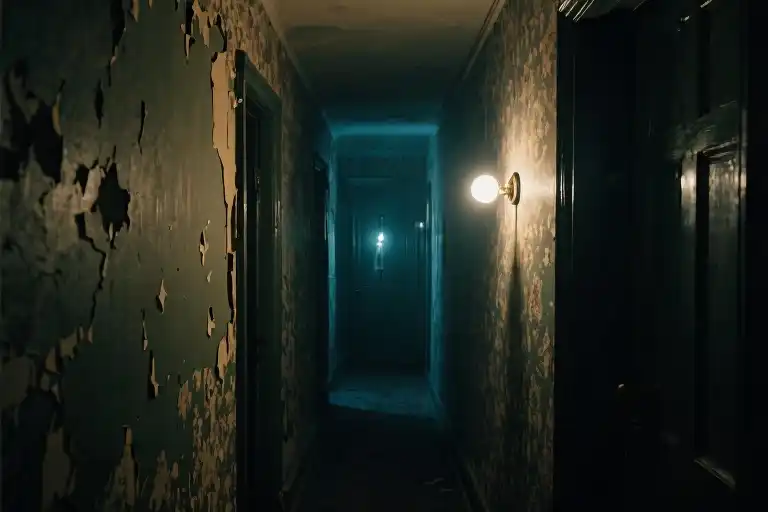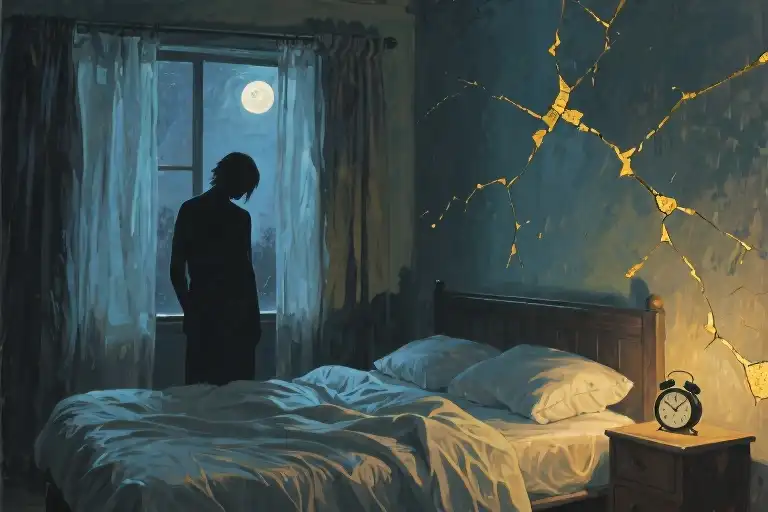The walls hum at odd hours, a sound you’ve learned to call ‘the house settling.’ The lights flicker—just faulty wiring, you tell guests. That cold spot in the hallway? An old building’s quirk. It takes a visitor’s widened eyes and hesitant question—Do your walls always whisper like this?—for you to realize: you’ve been living in a haunted house all along.
This is how toxic relationships operate. The red flags masquerade as quirks, the warning signs blend into the wallpaper of your daily life. You name the loneliness ‘independence,’ the walking on eggshells ‘being considerate.’ The sinking feeling when they cancel plans for the third time? You label it ‘understanding.’ One morning, you wake up to the realization that you’ve memorized the floorboards that don’t creak, learned which topics make the temperature drop—that you’ve become an expert navigator of a space that was never designed for comfort.
Unhealthy love feels like reading by a capricious light source. Just as your eyes adjust to a passage that feels true (Maybe this time—), the bulb sputters out. You sit motionless in the dark, pages splayed open, convincing yourself the story still makes sense if you just wait for the next flicker. But here’s the secret no one tells you: real love doesn’t require night vision. It doesn’t ask you to stitch together meaning from fragments of brightness.
Yet we stay. We stay through the 2am fights that evaporate by breakfast, through apologies that taste more like loopholes than promises. We mistake intermittent warmth for sunlight, confusing a struck match for the sun. The most haunting part? How easily a human voice can learn to echo like a ghost, how swiftly ‘I’ll try’ starts sounding like ‘forever.’
The Decorations of Self-Deception
We hang curtains over cracked windows and call it character. We polish warped floorboards until they gleam and declare them charming. That’s how it starts – by giving pretty names to things that should make us uneasy.
You learn to call his silence ‘introspection’ when it lasts for days. His jealousy becomes ‘passion’ when he questions your outfit choices. The way he cancels plans last minute? That’s just ‘spontaneity’. We become interior designers of dysfunction, rearranging red flags until they look like decor.
There’s a particular kind of loneliness that comes with this. It’s the silence between you and your best friend when you make excuses for him again. It’s the way your voice sounds tinny when you say “he’s just like that” to your reflection in the bathroom mirror at 2 AM. The rain outside always seems to laugh loudest when you’re explaining away another broken promise.
We do this not because we’re foolish, but because we’re hopeful. The human heart would rather believe in potential than accept disappointment. So we keep reading meaning into his vague texts, keep interpreting his mixed signals as some profound emotional Morse code only we can decipher.
Here’s the terrible truth: love shouldn’t require this much translation. Real connection doesn’t leave you constantly squinting at subtext, trying to discern whether today’s mood is your fault or his workload or the alignment of the stars. Healthy love speaks clearly, consistently – not in riddles designed to keep you guessing.
Yet we stay, mistaking the ache of uncertainty for the thrill of romance. We confuse anxiety butterflies with love butterflies, though any biologist will tell you they’re entirely different species. The former live in your throat and make it hard to breathe. The latter live in your chest and make everything feel lighter.
Somewhere along the line, we’ve been sold the idea that love is supposed to hurt. That the right relationship will be hard, will require sacrifice, will demand we shrink ourselves to fit. But here’s what no one tells you: the right love expands you. The right love feels like coming home to all the lights on and the heat turned up after walking through snow. The right love doesn’t make you check the weather report before speaking.
So ask yourself: are you decorating a home or disguising a haunted house? Are you building something or just learning to live with the leaks? The answers might terrify you, but they’ll also set you free.
Who Turned Off the Lights?
There comes a moment in every unbalanced relationship when the flicker becomes a blackout. You’re left sitting in emotional darkness, still holding the book of your shared story, waiting for the lights to come back on. Only this time, you start noticing the pattern – how the power cuts always happen when you’re just getting to the good part.
I kept count without realizing it. The seventh canceled date (“Something came up”), the forty-third “We’ll talk tomorrow” that never came. Each time, I’d rearrange my expectations like furniture in the dark, convincing myself the room hadn’t actually changed shape. Toxic relationships condition us to become experts at navigating through power failures, mistaking survival skills for intimacy.
What makes these “lights-out” moments particularly cruel isn’t just the broken promises – it’s the way we instinctively blame our own eyesight. “Maybe if I wait a little longer,” we think, “maybe if I adjust better to the dark.” We don’t yet understand that healthy love maintains a steady current. It doesn’t flicker between connection and abandonment like a faulty switch.
The real damage happens in those suspended moments between blackout and reluctant acceptance. That’s when we do the emotional math: subtracting our needs from the equation, dividing our attention to avoid overwhelming them, multiplying small gestures into grand proofs of love. We become human calculators trying to solve for x in an equation that was never balanced to begin with.
Eventually, you start recognizing the signs before the lights go out. That subtle shift in their voice when they’re about to disconnect. The way conversations start feeling like you’re handing them a live wire they don’t want to hold. You memorize the patterns like emergency exits, but never use them.
Here’s what no one tells you about darkness: it’s not the absence of light that hurts – it’s your eyes straining to see what isn’t there anymore. And love shouldn’t be an act of constant optical adjustment.
The Moment of Sudden Light
It happens in the most ordinary moments. You’re stirring cream into your third coffee of the morning when your reflection in the spoon catches you off guard – not your face, but the way your shoulders slump like they’re carrying the weight of all those unanswered texts. Or maybe it’s when you laugh at a friend’s story about their partner bringing them soup when they were sick, and you realize your laugh sounds hollow, even to your own ears.
These are the cracks where the light gets in. The kind of light that shows you what you’ve been ignoring in the dimness you’ve learned to call normal. For some, it’s seeing a healthy relationship up close for the first time, watching how easily affection flows without manipulation or games. For others, it’s a single sentence from an outsider: “You know most people don’t feel anxious when their phone buzzes, right?”
The awakening often comes with physical sensations – the way your stomach drops when you recognize a toxic relationship sign you’d been explaining away. There’s the metallic taste of panic when you tally all the times you’ve said “they didn’t mean it like that” about cutting remarks. The way your hands shake when you finally admit that love shouldn’t feel like walking on eggshells.
What makes these moments so jarring is their contrast to the gradual numbing that came before. The red flags you learned to ignore became background noise – the emotional equivalent of a flickering bulb you stopped noticing. Until suddenly, someone flips the main switch and you see the whole unstable wiring for what it is.
There’s grief in this clarity. The kind that makes you cry in the shower or during commercials. Not just for the relationship, but for all the time spent pretending the darkness was romantic. For every instance you mistook breadcrumbs for a feast. For the version of yourself that accepted so little when you deserved so much more.
Yet this painful awareness is also the beginning of freedom. Like realizing you’ve been reading with the book upside down – once you see it, you can’t unsee it. The shadows where unhealthy love hides start shrinking in the daylight of truth. And while the path forward might still be unclear, one thing becomes certain: you’ll never again confuse a haunted house for a home.
The Love Manual You Never Got
We spend years studying math formulas, historical dates, and chemical equations, but no one hands us a manual for recognizing real love. We’re left to decipher it through trial and error, mistaking red flags for romantic plot twists. Here’s what they never taught you:
Healthy love arrives with its own light source. You don’t need to adjust your vision or lower your standards to see its worth. It communicates in full sentences rather than cryptic hints – when it says “I’ll call at seven,” the phone actually rings at 6:58. There’s space for your emotions without making them feel like inconvenient guests. Disagreements resolve through conversation, not silent treatments that stretch like fog across days.
Unhealthy love operates like a faulty GPS. You’re constantly recalculating routes to accommodate its inconsistencies. One day you’re the destination, the next you’re rerouted through backroads of uncertainty. You memorize its erratic patterns like survival skills: “Tuesdays are bad mood days,” “Never mention their ex,” “Wait exactly 37 minutes before responding.” The relationship becomes a series of decoded warnings rather than shared joy.
The difference reveals itself in your nervous system. Healthy love feels like exhaling after holding your breath underwater. Your body relaxes into it without conscious effort. Unhealthy love keeps your muscles tense, always braced for the next emotional tremor. You might mistake this intensity for passion until you notice how exhaustion follows every encounter.
Some field notes from emotionally secure relationships:
- Plans get made and kept without last-minute cancellations that leave you scrambling
- Your vulnerabilities are treated like rare artifacts rather than weapons to be used against you
- Silence feels companionable rather than punitive
- You stop keeping mental scorecards of who messed up last
Meanwhile, toxic relationships condition you to accept breadcrumbs as feasts. You celebrate basic decency as extraordinary kindness because the baseline keeps shifting. When someone finally offers consistent warmth, it feels suspicious – like sunlight after years of candlelight.
This isn’t about perfection. Even healthy love has misunderstandings and bad days. The distinction lies in repair attempts: Will they circle back to difficult conversations? Do apologies come with changed behavior? Is there mutual effort to understand rather than blame?
Your body knows the difference before your mind admits it. That hollow feeling after seeing their name pop up? The way you rehearse conversations beforehand? Those aren’t relationship quirks – they’re internal alarms muffled by hope. Real love shouldn’t require emotional contortionism. You shouldn’t have to shrink to fit into someone’s life or expand to fill their emptiness.
The most telling question: Does this person make you feel more or less like yourself? Not some polished version, but your actual messy, glorious self. Because love at its best isn’t about transformation – it’s about revelation. It turns up the lights so you can finally read your own story clearly.
The Love That Makes You Squint
There’s a particular kind of exhaustion that comes from loving someone who keeps turning off the lights. Not the dramatic, door-slamming darkness, but the subtle flickers – the cancelled plans you explain away as ‘bad timing’, the emotional withdrawal you call ‘needing space’, the inconsistency you’ve learned to navigate like reading braille in the dark.
We become such experts at adjusting our vision. The human eye can distinguish about 500 shades of gray, and in these relationships, we learn every single one. We memorize the patterns: how long the silence lasts before an apology arrives (if it does), which topics make the temperature drop, what tone of voice means ‘I’m leaving without saying goodbye’. It’s astonishing what we can learn to see in the dark.
But here’s the cruel irony: the better we get at seeing in the dark, the less we realize how much we’re missing. Like developing night vision while the sun shines outside. That’s why the realization always comes as a shock – when you finally step into actual daylight and understand how much your eyes had compensated, how much you’d accepted as normal what was never meant to be endured.
Healthy love doesn’t require this particular skill set. It doesn’t ask you to become an interpreter of shadows or a translator of silences. Real connection feels more like walking into a well-lit room where you can finally stop squinting – where the words match the actions, where the promises don’t dissolve when you reach for them, where you’re not constantly bracing for the next power outage.
Yet we stay. We stay because humans are meaning-making creatures, and we’d rather have a painful story than no story at all. We stay because the intermittent reinforcement of occasional brightness feels like hope rather than what it actually is: a manipulation of our light-starved nervous systems. We stay because leaving would mean admitting how long we’ve been sitting in the dark, and that admission carries its own particular ache.
But here’s what I know now: love shouldn’t be a survival skill. It shouldn’t require you to develop superhuman perception or endless patience for broken circuits. The right relationship won’t make you grateful for crumbs of attention; it will set a table where you’re always invited to feast.
So if you’re reading this in the dim glow of someone else’s unreliable switch, ask yourself: what would happen if you stopped adjusting to the dark? What might become visible if you demanded the lights stay on? The answers might startle you – not because they reveal something new, but because they show you what you’ve known all along but couldn’t quite see in the unreliable flicker of a love that was never really built to last.





